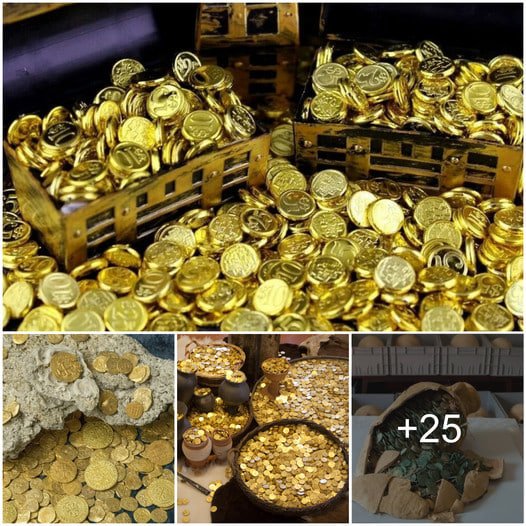
Legend has it that a vast treasure of 1,600 tons of gold has been resting at the bottom of Lake Baikal for centuries, shrouded in mystery. Despite many coveting this treasure, no one has dared to unravel this intriguing enigma.
The Guinness Book of Records has officially recognized Lake Baikal in Russia as the deepest lake in the world, boasting an area equivalent to that of Belgium and holding a staggering 20% of the Earth’s freshwater reserves. It is no wonder that this remarkable place has been bestowed with various names such as “World Fountain,” “Moon Lake,” “Beihai,” “Russian Pearl,” and “Innumerable Team Sea and Lake.”

Lake Baikal, located in Russia, is known as the world’s deepest lake. This untouched natural wonder holds many secrets that are yet to be discovered, making it a popular destination for adventurous tourists. During winter, the vast expanse of Lake Baikal freezes over, creating a breathtaking scene with snow-capped mountains in the background.
The combination of the massive lake and the towering mountains gives Lake Baikal a unique charm that attracts visitors from all over the world. There are also many fascinating legends that surround this mystical lake, including tales of up to 1,600 tons of gold lying at the bottom of its depths.

The enigmatic tale of 1,600 tons of gold plunging into Lake Baikal and remaining untouched by anyone resonates through history. In the year 1917, during the twilight of Tsar Nicholas II’s reign, a group of nobles sought to secure a vast treasure trove of gold and silver in a bid to escape westward, fleeing the turmoil engulfing Russia at the time. As they traversed Lake Baikal, they found themselves pursued by adversaries, forcing them to make a fateful decision. A staggering 1,600 tons of precious metals were jettisoned into the depths of Lake Baikal, where they have remained ever since.
An alternate version of the story speculates that the lost gold belonged to Tsar Nicholas II himself, intended to be moved to a secure location but fate intervened during a treacherous journey across Lake Baikal. A sudden thaw caused the treasure to plummet to the lake’s floor, alongside the soldiers escorting it. Despite these intriguing legends, the question remains: why has no one dared to recover this immense fortune from the depths of Lake Baikal?

The primary reason behind the challenge of salvaging the vast amount of gold in Lake Baikal is its depth and location. It has been reported that Lake Baikal’s deepest point reaches 1,637 meters and the total volume exceeds 2.36 billion cubic meters, making any retrieval effort nearly impossible.
Additionally, Lake Baikal is situated at the intersection of seismic belts, experiencing earthquakes every 10 years with a magnitude of around 6 on the Richter scale, and catastrophic earthquakes of approximately 9 every 30 years. Historical records show major earthquakes in 1862 and 1959, with a magnitude 9.5 earthquake in 1960 significantly impacting the lake’s surroundings and water levels.
Furthermore, Lake Baikal is home to a variety of freshwater species from the Tertiary period, including Baikal seals, Arctic white trout, Omul white trout, and sharks. The presence of these species has deterred treasure hunters, as any disturbance could cause irreparable damage to the delicate ecosystem.
The second reason for the challenge of salvaging the gold lies in the potential ecological impact. Human activities can disrupt the lake environment and affect the biological, plant, and mineral resources, posing a significant threat to the ecosystem’s balance and sustainability for current and future generations.

Many tourists flock to the beautiful lake, but questions arise about who would own any gold discovered in its depths, considering Lake Baikal’s status as a World Natural Heritage site. The indigenous people living around the lake are in the minority, residing in both the Republic of Buryatia and the Irkutsk Oblast. As a result, ownership of the lake is ambiguous. Locals share stories of witnessing incredible sights on the lake, from castles to boats, reinforcing the mystical aura surrounding Lake Baikal.
Legend has it that Tsar Nicholas II is the keeper of a supposed gold treasure hidden within the lake. Additionally, folklore suggests a divine force watches over Lake Baikal, granting eternal life to those brave enough to endure its icy waters at a bone-chilling 5 degrees Celsius. Intriguingly, reports of UFO encounters and strange incidents have also emerged from the lake, with some stories originating from classified Soviet Navy files.
One such account from 1982 describes a Russian Navy diver encountering humanoid beings in silver suits at a depth of 50 meters. Tragically, the three divers who pursued the beings perished, while four others sustained injuries. The mysteries and wonders of Lake Baikal continue to captivate and perplex those who dare to explore its depths.

The scenario is such that due to the lack of advanced science and technology, no one is willing to initiate the search for the truth behind the mysteries surrounding the lake. It is irrelevant whether the assumption holds any truth or not. The bottom of the lake holds a significant amount of gold.

